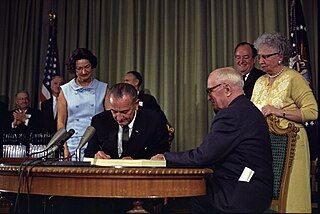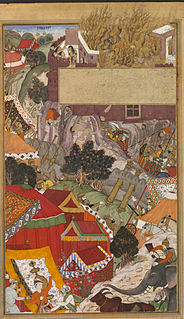
Electroconvulsive therapy (ECT), formerly known as electroshock therapy, is a psychiatric treatment in which seizures are electrically induced in patients to provide relief from mental disorders. The ECT procedure was first conducted in 1938 and rapidly replaced less safe and effective forms of biological treatments in use at the time. ECT is often used with informed consent as a safe and effective intervention for major depressive disorder, mania, and catatonia. ECT machines have been placed in the Class III category by the United States Food and Drug Administration (FDA) since 1976.
A patient's bill of rights is a list of guarantees for those receiving medical care. It may take the form of a law or a non-binding declaration. Typically a patient's bill of rights guarantees patients information, fair treatment, and autonomy over medical decisions, among other rights.

Mental health is a level of psychological well-being or an absence of mental illness - the state of someone who is "functioning at a satisfactory level of emotional and behavioural adjustment". From the perspectives of positive psychology or of holism, mental health may include an individual's ability to enjoy life, and to create a balance between life activities and efforts to achieve psychological resilience. According to the World Health Organization (WHO), mental health includes "subjective well-being, perceived self-efficacy, autonomy, competence, inter-generational dependence, and self-actualization of one's intellectual and emotional potential, among others." The WHO further states that the well-being of an individual is encompassed in the realization of their abilities, coping with normal stresses of life, productive work and contribution to their community. Cultural differences, subjective assessments, and competing professional theories all affect how one defines "mental health".
Health care in Ireland is two-tier: public and private sectors exist. The public health care system is governed by the Health Act 2004, which established a new body to be responsible for providing health and personal social services to everyone living in Ireland – the Health Service Executive. The new national health service came into being officially on 1 January 2005; however the new structures are currently in the process of being established as the reform programme continues. In addition to the public-sector, there is also a large private healthcare market.
Peter Roger Breggin is an American psychiatrist and critic of shock treatment and psychiatric medication. In his books, he advocates replacing psychiatry's use of drugs and electroconvulsive therapy with psychotherapy, education, empathy, love, and broader human services.

The Mental Health Act 1983 (c.20) is an Act of the Parliament of the United Kingdom which applies to people in England and Wales. It covers the reception, care and treatment of mentally disordered persons, the management of their property and other related matters. In particular, it provides the legislation by which people diagnosed with a mental disorder can be detained in hospital or police custody and have their disorder assessed or treated against their wishes, informally known as "sectioning". Its use is reviewed and regulated by the Care Quality Commission. The Act has been significantly amended by the Mental Health Act 2007 and the Mental Health Units Act 2018.
Suicide intervention is a direct effort to prevent a person or persons from attempting to take their own life or lives intentionally.

Suicide is a crime in some parts of the world. However, while suicide has been decriminalized in the western countries, the act is still stigmatized and discouraged. In other contexts, suicide could be utilized as an extreme expression of liberty, as is exemplified by its usage as an expression of devout dissent towards perceived tyranny or injustice which occurred occasionally in cultures like ancient Rome or medieval Japan.
Healthcare in Pakistan is administered mainly in the private sector which accounts for approximately 80% of all outpatient visits. The public sector was until recently led by the Ministry of Health. However, the Ministry was abolished in June 2011 and all health responsibilities were devolved to provincial health departments which had been the main executors of public sector health programs. The Ministry of National Regulations and Services was reestablished in April 2012. Like other South Asian countries, health and sanitation infrastructure is adequate in urban areas but is generally poor in rural areas.
Electroconvulsive therapy is a controversial psychiatric treatment in which seizures are induced with electricity. ECT was first used in the United Kingdom in 1939 and, although its use has been declining for several decades, it was still given to about 11,000 people a year in the early 2000s.

The philosophy of healthcare is the study of the ethics, processes, and people which constitute the maintenance of health for human beings. For the most part, however, the philosophy of healthcare is best approached as an indelible component of human social structures. That is, the societal institution of healthcare can be seen as a necessary phenomenon of human civilization whereby an individual continually seeks to improve, mend, and alter the overall nature and quality of their life. This perennial concern is especially prominent in modern political liberalism, wherein health has been understood as the foundational good necessary for public life.

In 2016 the number of suicides in India had increased to 230,314. Suicide was the most common cause of death in both the age groups of 15–29 years and 15–39 years.
This disability rights timeline lists events outside the United States relating to the civil rights of people with disabilities, including court decisions, the passage of legislation, activists' actions, significant abuses of people with disabilities that illustrate their lack of civil rights at the time, and the founding of various organizations. Although the disability rights movement itself began in the 1960s, advocacy for the rights of people with disabilities started much earlier and continues to the present.

The Section 309 in the Indian Penal Code lays down the punishment for attempted suicide.
Involuntary commitment or civil commitment is a legal process through which an individual with symptoms of severe mental illness is court-ordered into treatment in a hospital (inpatient) or in the community (outpatient).
Mental health policies is a framework of the government highlighting its vision towards dealing with mental and neurological disorders in Nigeria Though there are policies aimed at addressing mental health issues in Nigeria, in-depth information on mental health service in Nigeria is non-existent. This makes it difficult to identify areas of needs, coordinate activities of advocacy groups, and to make informed decision about policy direction. In effect, there is continued neglect of mental health issues as well as the many challenges that results from it in spite of existing government policy. About 20 million Nigerians suffer from mental illness. A good number of them go without professional assistance. The World Health Organization estimates that only about three percent of the government's budget on health goes to mental health.

Mental health issues are prevalent in South Korea, with the second highest suicide rate in the world and the highest rate of hospitalizations for mental illness among OECD countries. South Korea has state-funded mental health services, the majority of which are inpatient hospital facilities, but they are largely underfunded and underutilized. Despite the prevalence of mental illness, social stigma remains prevalent throughout the South Korean population, which discourages sufferers from seeking treatment. Mental illness, while present across all demographic groups, is most common among the elderly and adolescents in South Korea.
The Human Immunodeficiency Virus and Acquired Immune Deficiency Syndrome Act, 2017, often shortened to the HIV/AIDS Prevention Act or simply the HIV/AIDS Act, is an Act of the Parliament of India that prohibits discrimination against individuals who are diagnosed with HIV/AIDS. The law makes India the first country in South Asia to prohibit discrimination against people living with HIV/AIDS, and also makes India the largest country to have such a law.

Mental health in New Zealand generally follows the trends of mental health in other OECD countries. New Zealand's 'outdoor life style' and high standard of living are balanced by isolation and a self-reliant culture, which discourages asking for help. Historically, people with mental health problems were institutionalised, whereas now the focus is on care in the wider community. The stigma around poor mental health has been lessened in recent years as a result of this change and public education campaigns. However, New Zealand's minorities and youth continue to be over-represented in the negative mental health statistics.












